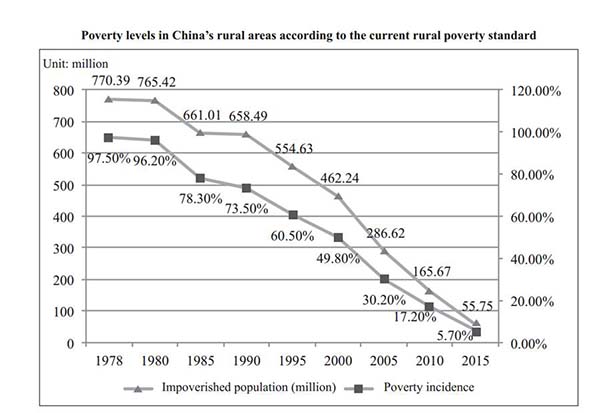Targeted efforts to achieve 2020 poverty elimination goal
China Daily, October 20, 2016 Adjust font size:

Graphics shows the poverty levels in China's rural areas according to the current rural poverty standard, Oct. 17, 2016. [Photo/Xinhua]
Editor's Note: The State Council Information Office on Monday issued a white paper on China's progress in poverty reduction and human rights. The following are some experts' comments on China's poverty alleviation and human rights work:
There is no doubt that China has made remarkable strides in reducing poverty levels. Once a country with over 942 million living in poverty, it has now reduced this to 55 million. Additionally, with a targeted poverty alleviation strategy in the 13th Five-Year Plan (2016-20), the aim is for poverty to become history in China by 2020, leaving no one behind.
Poverty is dynamic, and using innovative approaches to help identify and track the poor in a more real-time and real-place manner will be vital to achieve this. The UN has experience globally, and can assist China experimenting with alternative instruments, such as using big data to complement the traditional household surveys that feed the national database. Moreover, with more and more financial resources being allocated for poverty reduction, the UN can assist with effective implementation, including assessing the cost-effectiveness of public spending, via setting up an overarching appraisal system.
Nicholas Rosellini, designated United Nations resident coordinator in China
Poverty is not just an economic issue. It is impossible to completely solve the problem of poverty through its economic growth alone. To eradicate poverty is in essence a human rights issue requiring social order with human dignity as the foundation. In this sense, we should look at the poverty issue from the perspective of human rights.
The white paper once again stressed that looking at the poverty problem from the perspective of better protecting human rights is the Chinese government's basic stance. With such a perspective, the government needs to ensure all people can live a decent life and thus make all people share the fruits of the country's fast-growing economy and realize the goal of common prosperity.
Zheng Zhihang, a researcher at the school of law, Shandong University
Since the 1980s, the Chinese government has started a robust poverty relief campaign and thus established a poverty reduction path with Chinese characteristics through three decades of active exploration. The country's poverty relief efforts take a pragmatic approach and have a sound systematic framework. They pursue the ideal of poverty eradication with practical and effective measures.
From the formulation of an overall program for regional poverty relief to the identifying of "counties of poverty", to promoting poverty relief for entire villages and then for individual families, the country's poverty reduction work has gradually progressed from an overall to the individual. Such a targeted poverty relief approach has helped more effectively identify the roots of poverty and allow differentiated and targeted measures to lift impoverished population out of poverty.
Meng Qingtao, a researcher on human rights studies, Southwest University of Political Science and Law
The Chinese government's white paper on its progress in poverty reduction and human rights reviews the achievements the country has made in lifting impoverished ethnic groups out of poverty. Since the 18th National Congress of the Communist Party of China, convened in late 2012, China has formulated a series of special poverty relief policies to accelerate its work of poverty reduction in these regions. Through the making and implementing of targeted plans, earmarking special funds and supporting their characteristic industries, the country has considerably improved infrastructure in these regions and raised the living conditions of local residents.
While creating a better life quality for ethnic groups through these targeted and viable measures, the country has also employed innovative methods to combine its poverty relief work with their distinctive industries and resources to create more opportunities and driving forces for their sustainable development and finally self-development.
Wang Liwan, a researcher on human rights studies, China University of Political Science and Law